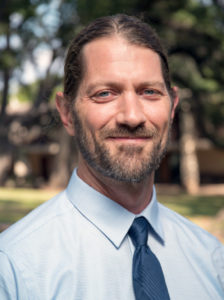On July 17, 2014, Eric Garner spoke his final words, and these words later became a rallying cry for the Black Lives Matter movement: “I can’t breathe.” There is something, though, that you may not know about these words. The illegal choke hold that the police officer used to pin him to the sidewalk was only the immediate cause of his death; an autopsy later revealed that the officer had an accomplice. Like so many poor people of color living among the highway and factory fumes on Staten Island, Eric Garner had asthma. Breathing was a challenge long before that officer, suspecting Mr. Garner of peddling cigarettes without proper licensing, wrestled him down and locked a forearm on his throat.
When we consider air pollution and the other markers of our current climate emergency, we likely observe that the crisis is killing ancient trees and wiping out thousands of non-human lifeforms. And that is true. We also speak often of a high human cost of communal habits of unsustainable development. That is also true. We may further assume that this cost is and will be shared equally by all members of the human race. That is not true.
For those with eyes to see it, Mr. Garner’s autopsy revealed a deep partnership between racial and ecological injustice. Melanie Harris refers to this as the “parallel oppressions” under which our planet and people of color suffer. The age of climate emergency caused by human technology—the era we are now calling “The Anthropocene”—is warming our oceans, filling our air with carbon, and making our clean water a precious and scarce resource. And yet having “means”—wealth, access to the best education and the highest paying jobs—allows some of us to mitigate the impact this crisis will have on us and our families.
Mr. Garner’s death is not, obviously, the first opportunity we’ve had to notice these parallel oppressions. When Dr. King made his fatal trip to Memphis in 1968, it was to support sanitation workers who were on strike after two Black garbage collectors had been crushed to death by a malfunctioning truck. The city’s response suggested what was already obvious to so many: America is a place where the bill for our standard of living is passed down from the primary beneficiaries to the primary payers. To be poor and Black in America is to be left holding this bill. Or, discarding the metaphor for the literal situation in Memphis: it is to be in danger of finding oneself crushed by affluent garbage.
When King and others—including now Bishop Curry—began speaking of Beloved Community, they fastened upon a term that allows us to see something deeply important in the justice work of Christians. Our calling is not to find a cause to which to rally. This is to treat vulnerable neighbors as competitors for limited resources, and ultimately to make choices about “bandwidth” in the midst of a competition of goods. (Should we give ourselves—our souls and our bodies—to the problems of racial injustice, or to the climate crisis? Which one matters more?) Rather, our calling is to form ourselves into communities with eyes to see the suffering that is around us, suffering that locks creatures of God out of the abundant life of resurrected joy that Jesus came offering. Kierkegaard wrote about this in Works of Love: it is a life that opens its eyes and learns to love the first one it sees. I would add also that learns to see and love what is absent, or invisibly present. Like Mr. Garner’s scarred lungs.
I think that when God imagines a particular church, God imagines a community that loves well. That opens its eyes and sees not just a suffering person, not just systemic suffering of groups, but also the human habits that make the earth on which those sufferers stand an unwelcoming place. Habits that make the water they drink something other than living water. That make the air around them a force that fights against the very life within them. And then God imagines a group of people who begin to do the hard work of love.
These Beloved Communities need pastors, and one of our primary reasons for existing at Seminary of the Southwest is to lead a formation process for ordained ministers of such Communities. Pastors can be, as I once heard a theologian say, “first responders to climate crisis.” Not because they lobby on Capitol Hill for new policies (though they might), but because they live in places where the crisis does real and lasting damage, especially to our poorest and most vulnerable neighbors.
Remember that “pastor” is a metaphor, suggesting that a leader of a Christian community is like a shepherd of sheep. That shepherd must first and foremost know the land well: where there are rocks and briars, where the wolves hide, and where to find green pastures and still waters. Our students do not become leaders of people in an abstraction called “community:” they become pastors who can learn from their flock what it is like to be a person, a family, a neighborhood, living and breathing upon a particular patch of earth.
Our Beloved Communities must become places of relentless and courageous love. Communities that have the critical tools and resources to see, and then to love well, the vulnerable ones with whom we share our patches of soil and our molecules of oxygen. Who—and what—here in this place is not hearing Christ’s invitation to enjoy abundant life? Who and what cannot taste the living water? What person, what creature, is face down on the concrete-laden earth in front of me?
Who in this place can’t breathe?
This spring, the Sowing Holy Questions blog will focus on issues of racial healing. Writers will reflect on what has been done, what change ought to happen, and offer visions for healing in our communities.


